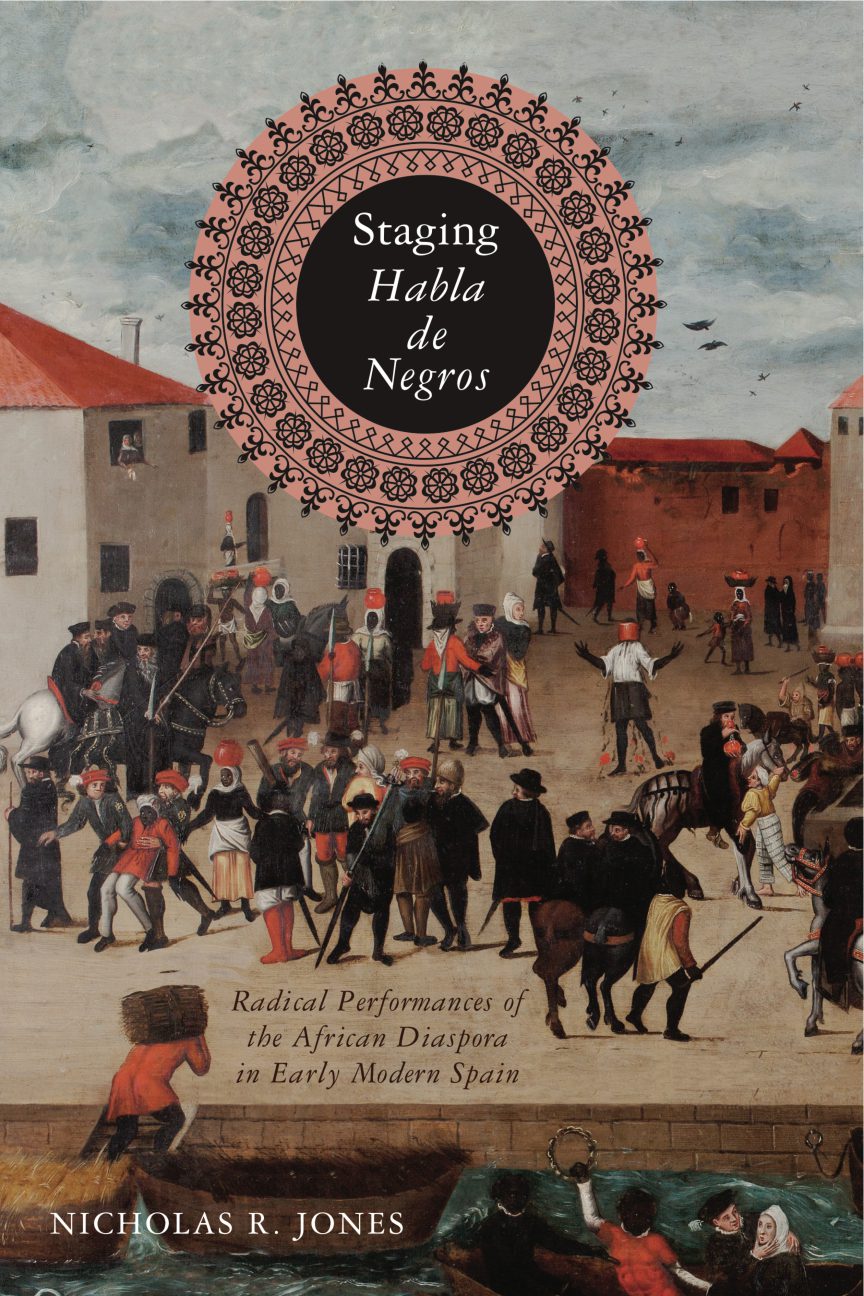Staging Habla de Negros: A New Book on Radical Black Performance in Early Modern Spain
 The author of Staging Habla de Negros: Radical Performances of the African Diaspora in Early Modern Spain, Nicholas R. Jones, is an Assistant Professor of Spanish and Africana Studies at Bucknell University, where his research agenda explores the agency, subjectivity, and performance of Black diasporic identities in early modern Iberia and the Ibero-Atlantic world. He is co-editor of Early Modern Black Diaspora Studies: A Critical Anthology with Cassander L. Smith and Miles P. Grier. His journal articles have appeared in—or will appear in—Arizona Journal of Hispanic Cultural Studies, Hispanic Review, Journal for Early Modern Cultural Studies, postmedieval, and University of Toronto Quarterly. He is currently at work on two new book projects: one that examines the role of material culture in the literary production of Black women in early modern Portugal and Spain and another that uncovers the Inquisition dossier of Catalina Muñoz. Follow him on Twitter @Bibliophilenick.
The author of Staging Habla de Negros: Radical Performances of the African Diaspora in Early Modern Spain, Nicholas R. Jones, is an Assistant Professor of Spanish and Africana Studies at Bucknell University, where his research agenda explores the agency, subjectivity, and performance of Black diasporic identities in early modern Iberia and the Ibero-Atlantic world. He is co-editor of Early Modern Black Diaspora Studies: A Critical Anthology with Cassander L. Smith and Miles P. Grier. His journal articles have appeared in—or will appear in—Arizona Journal of Hispanic Cultural Studies, Hispanic Review, Journal for Early Modern Cultural Studies, postmedieval, and University of Toronto Quarterly. He is currently at work on two new book projects: one that examines the role of material culture in the literary production of Black women in early modern Portugal and Spain and another that uncovers the Inquisition dossier of Catalina Muñoz. Follow him on Twitter @Bibliophilenick. In this volume, Nicholas R. Jones analyzes white appropriations of Black African voices in Spanish theater from the 1500s through the 1700s, when the performance of Africanized Castilian, commonly referred to as habla de negros (Black speech), was in vogue.
In this volume, Nicholas R. Jones analyzes white appropriations of Black African voices in Spanish theater from the 1500s through the 1700s, when the performance of Africanized Castilian, commonly referred to as habla de negros (Black speech), was in vogue.
Focusing on Spanish Golden Age theater and performative poetry from authors such as Calderón de la Barca, Lope de Rueda, and Rodrigo de Reinosa, Jones makes a strong case for revising the belief, long held by literary critics and linguists, that white appropriations and representations of habla de negros language are “racist buffoonery” or stereotype. Instead, Jones shows Black characters who laugh, sing, and shout, ultimately combating the violent desire of white supremacy. By placing early modern Iberia in conversation with discourses on African diaspora studies, Jones showcases how Black Africans and their descendants who built communities in early modern Spain were rendered legible in performative literary texts.
Accessibly written and theoretically sophisticated, Jones’s groundbreaking study elucidates the ways that habla de negros animated Black Africans’ agency, empowered their resistance, and highlighted their African cultural retentions. This must-read book on identity building, performance, and race will captivate audiences across disciplines.
A crucial intervention in discussions about black Africans in Renaissance Europe. Focusing specifically on early modern Spain, Jones offers insightful and nuanced readings of the ways in which (mostly) white Spanish writers appropriated black speech in staged performances and poetry, arguing that such appropriations actually encode black African agency. Importantly, he decenters the author and asks readers to approach these literary forms from the margin to understand how forces beyond the author influence text formation. Jones’s careful, against-the-grain readings open up to readers new archives (and re-present familiar ones from fresh, intriguing perspectives) for the study of black cultural experiences in the Renaissance era. — Cassander L. Smith, author of Black Africans in the British Imagination: English Narratives of the Early Atlantic World
J.T. Roane: What type of impact do you hope your work has on the existing literature on this subject?
